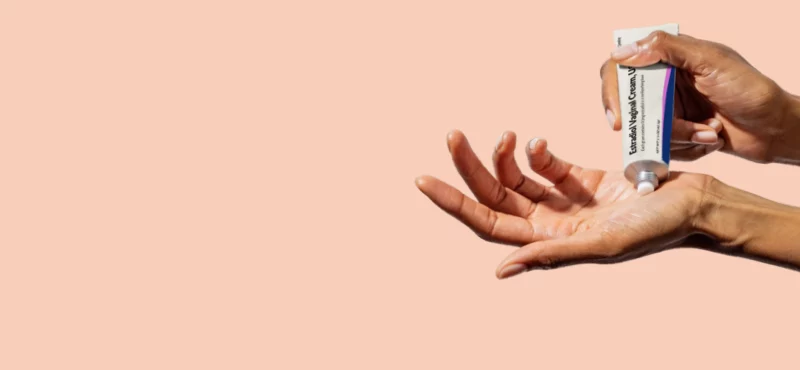Are you a woman in menopause or perimenopause? If so, you may experience urinary tract infections (UTIs) more frequently than when you were younger. This is due to changes in your body caused by menopause.
If you’re experiencing frequent UTIs, you may be wondering what’s triggering your UTI and how you can prevent a UTI naturally without having to resort to endless doctor’s visits and rounds of antibiotics.
At Interlude, our goal is to provide unprecedented access to research and solutions to help you live well in your body as you get older. In this article, we’re focused on helping women in perimenopause and menopause understand what’s causing frequent UTIs and how to prevent them.
We’ll review what are the hormonal changes that cause frequent UTIs, how vaginal estrogen works to prevent and greatly reduce the risk of UTIs, and talk about other UTI prevention tips that are not shown to be as effective as vaginal estrogen but that may be worth trying.
Menopause and UTIs: What's the connection?
Women of all ages experience UTIs. But studies have shown that older women are more likely to get a UTI and suffer from recurrence than younger women.
UTIs can be difficult to prevent when you’re older - especially when all of the things you did when you younger (like peeing after sex, practicing good hygeine, and drinking lots of water) don’t seem to work anymore.
Understanding what causes UTIs as you get older can help you take effective steps to prevent UTIs. Common UTI risk factors for older women include:
- Perimenopause
- Menopause
- Vaginal atrophy
If any of these risk factors apply to you, you may be experiencing declining estrogen levels which can lead to vaginal and urinary changes that cause UTIs. Read on to learn more.


Menopause UTI symptoms
UTI symptoms in perimenopause or menopause are characterized by changes known as vaginal atrophy (VA) or the genitourinary syndrome of menopause (GSM). Vaginal atrophy is caused by declining estrogen levels and can include a constellation of symptoms that affect the entire vulva.
Urinary symptoms can include:
- Frequent UTIs
- Pain or burning with urination
- Urgency to pee
Other symptoms of vaginal atrophy include:
- Changes in vaginal pH
- Vaginal dryness
- Shortening and tightening of the vaginal canal
- Painful sex


If this sounds familiar, then rest assured you are not alone. Vaginal atrophy is a natural part of menopause and aging - up to 90% of post-menopausal women have been shown to have at least one symptom of vaginal atrophy.
This is where vaginal estrogen comes into play as it can reverse vaginal atrophy and restore balance to the vagina's flora - which helps to prevent UTIs.
Vaginal estrogen cream for preventing UTIs
Vaginal estrogen is one of the most effective treatments for preventing frequent UTIs that are related to menopause. It's available as a cream, suppository, or a ring. And you can obtain a prescription for vaginal estrogen through your primary care provider, gynecologist, or an online clinic such as Interlude starting at about $30/month.
How effective is vaginal estrogen for preventing UTIs?
Unlike antibiotics which can be prescribed in low doses to prevent infection, vaginal estrogen works to address the root cause of infection. In a recent study, 68 percent of postmenopausal women with recurrent UTIs treated with vaginal estrogen alone did not go on to receive additional therapy1.
Vaginal estrogen acts to prevent UTIs in two ways. First, it helps restore the normal balance of bacteria in the vagina. Second, it restores moisture and plumpness to skin in and around the vagina. Now let’s dig into this a little more.
Why is it important to restore the normal balance of bacteria in the vagina?
The hormone estrogen is naturally produced by your body and allows beneficial bacteria (such as Lactobacillus) in the vagina to thrive. But falling estrogen levels in peri-menopausal and menopausal women can diminish the levels of Lactobacillus. As a result, the levels of bacteria such as E. coli can increase. And since your vagina is located close to your urethra, bacteria such as E. coli can enter the urinary system and cause infection.
You can prevent this with vaginal estrogen. Vaginal estrogen works with your body to help Lactobacillus thrive again - and this can prevent UTIs.


Why is it important to keep the vaginal skin healthy?
In addition to promoting balanced vaginal flora, estrogen keeps the skin in and around the vagina moist and plump and healthy. But declining estrogen levels in perimenopause and menopause can cause changes to the labia and urethra. For example, if you’ve noticed that your labia have become smaller, then your urethra could be more exposed to infection. And if E. coli is present in the vagina, then you could be facing a situation where bacteria from the vagina can more easily enter the urinary system and cause an infection.
Is vaginal estrogen safe?
Vaginal estrogen is a well-studied medication that's been prescribed for decades and is available in several FDA-approved formulations. It has not been shown to cause cancer, cardiovascular problems, dementia, or any other serious issues. It's confusing because oral estrogen has been shown to cause serious risks. But vaginal estrogen is prescribed in low doses and is only applied to the affected tissues, so it does not significantly raise the level of estrogen in your bloodstream.
How long do you need to use vaginal estrogen?
You can take vaginal estrogen for as long as you need to prevent UTIs. Your body won't develop a resistance to it. Keep in mind that if you stop using vaginal estrogen, symptoms are likely to return.


In addition to helping prevent UTIs, vaginal estrogen can also help relieve menopause symptoms such as vaginal dryness and pain during intercourse. So not only does it provide protection from uncomfortable infections, it also helps improve the overall health of your vulva!
Other options to prevent UTIs
There are a number of prescription and over-the-counter products that you can take daily to prevent UTIs:
- Low-dose daily antibiotic
- D-mannose
- Cranberry juice
- Probiotic supplement


Studies show that repeated use of antibiotics, including low-dose antibiotics to prevent UTIs, can cause antibiotic resistance. If you’re looking for an alternative to antibiotics, you might consider D-mannose.
In 2020, a review of several studies concluded that D-mannose was as effective as antibiotics at preventing UTIs.
If you’re using cranberry juice to prevent UTIs, studies show that 8-10 ounces per day may be effective.
If you do want to try a vaginal probiotic supplement, consider one that contains Lactobacillus. Studies show that this particular bacteria may prevent UTIs in younger women, but more studies need to be done that include older women.
How to get help preventing UTIs
While UTI prevention strategies such as drinking plenty of water, wearing loose clothing, and urinating regularly may help prevent UTIs, you may find that you continue to experience UTI symptoms.
Some women may turn to solutions like cranberry juice or supplements - but these solutions have little evidence and are not rigorously tested by the FDA.
If you want to prevent recurring UTIs, prescription treatment with vaginal estrogen may be a better option. Talk to a medical provider about your symptoms and see if a prescription for vaginal estrogen could help. At Interlude, we offer UTI prevention solutions - including an online consult with board-certified physician and prescription treatment with vaginal estrogen.


Without treatment, UTIs can cause complications, so it’s better to get help sooner rather than later. And, by taking preventive measures, you can protect yourself against pain and discomfort while enjoying life at any age!



